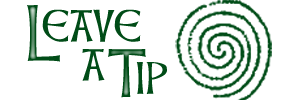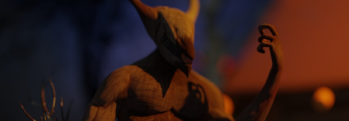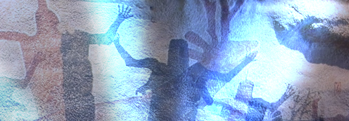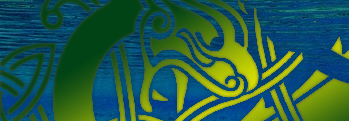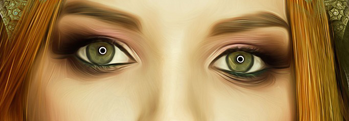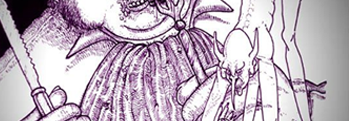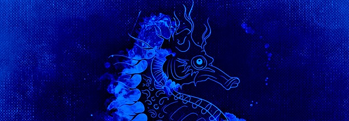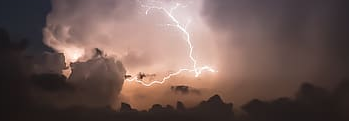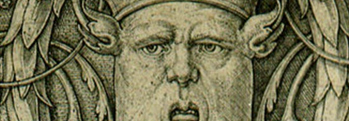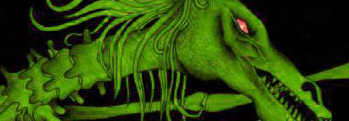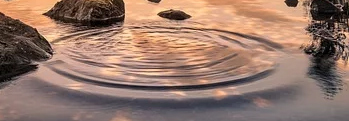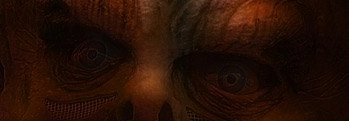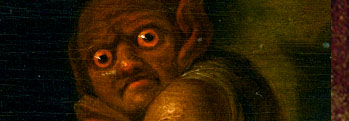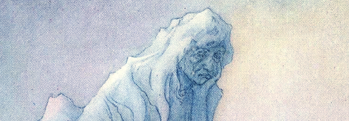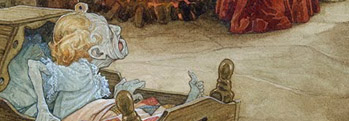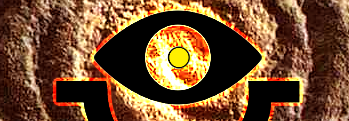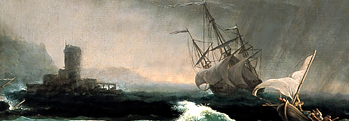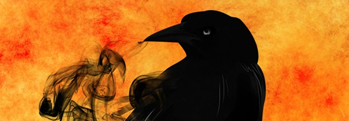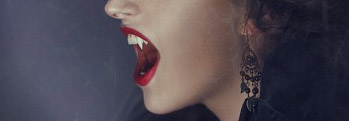Fergus and the Demon Wind
Irish and Celtic myths and legends, Irish folklore and Irish fairy tales from Irish Gods and Monsters
Strange and fearsome was the story of Fergus and the Demon Wind
Of all the different kinds of goblins that haunted the lonely places of Ireland in days of old, air-demons were most dreaded by the people. They lived among clouds, and mists, and rocks, and they hated the human race with the utmost malignity. In those times lived in the north of Desmond (the present county of Cork) a man man named Fergus O'Mara. His farm lay on the southern slope of the Ballyhoura Mountains, along which ran the open road that led to his house. This road was not shut in by walls or fences; but on both sides there were scattered trees and bushes that sheltered it in winter, and made it dark and gloomy when you approached the house at night.
 Beside the road, a little way off from the house, there was a spot that had an evil name all over the country, a little hill covered closely with copsewood, with a great craggy rock on top, from which, on stormy nights, strange and fearful sounds had often been heard—shrill voices, and screams, mingled with loud fiendish laughter; and the people believed that it was the haunt of air-demons. In some way it had become known that these demons had an eye on Fergus, and watched for every opportunity to get him into their power.
Beside the road, a little way off from the house, there was a spot that had an evil name all over the country, a little hill covered closely with copsewood, with a great craggy rock on top, from which, on stormy nights, strange and fearful sounds had often been heard—shrill voices, and screams, mingled with loud fiendish laughter; and the people believed that it was the haunt of air-demons. In some way it had become known that these demons had an eye on Fergus, and watched for every opportunity to get him into their power.
He had himself been warned of this many years before, by an old monk from the neighbouring monastery of Buttevant, who told him, moreover, that so long as he led a blameless, upright life, he need have no fear of the demons; but that if ever he yielded to temptation or fell into any great sin, then would come the opportunity for which they were watching day and night. He never forgot this warning, and he was very careful to keep himself straight, both because he was naturally a good man, and for fear of the air-demons.
Some time before the occurrence about to be related, one of Fergus's children, a sweet little girl about seven years of age, fell ill and died. The little thing gradually wasted away, but suffered no pain; and as she grew weaker she became more loving and gentle than ever, and talked in a wonderful way, quite beyond her years, of the bright land she was going to. One thing she was particularly anxious about, that when she was dying they should let her hold a blessed candle in her hand. They thought it very strange that she should be so continually thinking and talking of this; and over and over again she made her father and mother promise that it should be done. And with the blessed candle in her hand she died so calmly and sweetly that those round her bed could not tell the exact moment.
About a year after this, on a bright Sunday morning in October, Fergus set out for Mass. The place was about three miles away, and it was not a chapel, but a lonely old fort, called to this day Lios an Aifrinn, the fort of the Mass. A rude stone altar stood at one side near the mound of the fort, under a little shed that sheltered the priest also; and the congregation worshipped in the open air on the green plot in the centre. For in those days there were many places that had no chapels; and the people flocked to these open-air Masses as faithfully as we do now to our stately comfortable chapels. The family had gone on before, the men walking and the women and children riding; and Fergus set out to walk alone.
Just as he approached the Demons' Rock he was greatly surprised to hear the eager yelping of dogs, and in a moment a great deer bounded from the covert beside the rock, with three hounds after her in full chase. No man in the whole country round loved a good chase better than Fergus, or had a swifter foot to follow, and without a moment's hesitation he started in pursuit.
But in a few minutes he stopped up short; for he bethought him of the Mass, and he knew there was little time for delay. While he stood wavering, the deer seemed to slacken her pace, and the hounds gained on her, and in a moment Fergus dashed off at full speed, forgetting Mass and everything else in his eagerness for the sport. But it turned out a long and weary chase. Sometimes they slackened, and he was almost at the hounds' tails, but the next moment both deer and hounds started forward and left him far behind.
Sometimes they were in full view, and again they were out of sight in thickets and deep glens, so that he could guide himself only by the cry of the hounds. In this way he was decoyed across hills and glens, but instead of gaining ground he found himself rather falling behind.
Mass was all over and the people dispersed to their homes, and all wondered that they did not see Fergus; for no one could remember that he was ever absent before. His wife returned, expecting to find him at home; but when she arrived there was trouble in her heart, for there were no tidings of him, and no one had seen him since he had set out for Mass in the morning.
Meantime Fergus followed up the chase till he was wearied out; and at last, just on the edge of a wild moor, both deer and hounds disappeared behind a shoulder of rock, and he lost them altogether. At the same moment the cry of the hounds became changed to frightful shrieks and laughter, such as he had heard more than once from the Demons' Rock. And now, sitting down on a bank to rest, he had full time to reflect on what he had done, and he was overwhelmed with remorse and shame.
Moreover, his heart sank within him, thinking of the last sounds he had heard; for he believed that he had been allured from Mass by the cunning wiles of the demons, and he feared that the dangerous time had come foretold by the monk. He started up and set out for his home, hoping to reach it before night. But before he had got half-way night fell and a storm came on, great wind and rain and bursts of thunder and lightning. Fergus was strong and active, however, and knew every turn of the mountain, and he made his way through the storm till he approached the Demons' Rock.
Suddenly there burst on his ears the very same sounds that he had heard on losing sight of the chase—shouts and shrieks and laughter. A great black ragged cloud, whirling round and round with furious gusts of wind, burst from the rock and came sweeping and tearing towards him. Crossing himself in terror and uttering a short prayer, he rushed for home.
But the whirlwind swept nearer, till at last, in a sort of dim, shadowy light, he saw the black cloud full of frightful faces, all glaring straight at him and coming closer and closer. At this moment a bright light dropped down from the sky and rested in front of the cloud; and when he looked up, he saw his little child floating in the air between him and the demons, holding a lighted candle in her hand. And although the storm was raging and roaring all round, she was quite calm—not a breath of air stirred her long yellow hair—and the candle burned quietly.
Even in the midst of all his terror he could observe her pale gentle face and blue eyes just as when she was alive, not showing traces of sickness or sadness now, but lighted up with joy. The demons seemed to start back from the light, and with great uproar rushed round to the other side of Fergus, the black cloud still moving with them and wrapping them up in its ragged folds; but the little angel floated softly round, still keeping between them and her father.
Fergus ran on for home, and the cloud of demons still kept furiously whirling round and round him, bringing with them a whirlwind that roared among the trees and bushes and tore them from the roots; but still the child, always holding the candle towards them, kept floating calmly round and shielded him.
At length he arrived at his house; the door lay half-open, for the family were inside expecting him home, listening with wonder and affright to the approaching noises; and he bounded in through the doorway and fell flat on his face. That instant the door—though no one was near—was shut violently, and the bolts were shot home. They hurried anxiously round him to lift him up, but found him in a death-like swoon.
Meantime the uproar outside became greater than ever; round and round the house it tore, a roaring whirlwind with shouts and yells of rage, and great trampling, as if there was a whole company of horsemen. At length, however, the noises seemed to move away farther and farther off from the house, and gradually died away in the distance. At the same time the storm ceased, and the night became calm and beautiful.
The daylight was shining in through the windows when Fergus recovered from his swoon, and then he told his fearful story; but many days passed over before he had quite recovered from the horrors of that night. When the family came forth in the morning there was fearful waste all round and near the house, trees and bushes torn from the roots, and the ground all trampled and torn up. After this the revelry of the demons was never again heard from the rock; and it was believed that they had left it and betaken themselves to some other haunt.
First recorded by Dr. P.W. Joyce
Below on the map is marked the place where these events probably took place.
More Irish Gods and Monsters
The Irish elk, or more properly deer, was the single largest species of deer which has ever existed. They were slightly larger than the modern moose, but their spread of antlers was vast - up to four meters or thirteen feet across in some specimens! These magnificent creatures roamed the plains and forests of Ireland and Europe before, during and a ... [more]
It was a fine day in Ireland many years ago when Fionn and his Fianna took a fancy to go out hunting. Warm was the sun amid the whispering glades of ancient forests, gentle was the breeze and sweet the scent of summer flowers in its bosom. Sweeter yet was the sight of a mighty deer to the eyes of the hunters, and so they gave chase, howling with de ... [more]
It is during the darkest winter nights that we sit inside our houses and listen to the wind hammering at our windows and doors, as if it had a mind and will of its own – as if it wished to do us harm! The old people of Ireland believed that was the literal truth, that there were demons of the air, or demna aeóir thronging about the ... [more]
No tale of ancient Ireland could be complete without mentioning the Fomorians, dreaded foes of the Tuatha Dé Danann and all who came to conquer Ireland. The meaning of their name is debated even today, although most agree that the first part, fó, means “from below” or “nether” and the latter part means “t ... [more]
The dragons of Ireland were not like the dragons of other places, since they did not have wings or often even claws, and only rarely did they breathe fire, if at all! The were called the Ollphéisteanna, which means “great worms” or “mighty reptiles”, the terrible serpents of the world that was. The greatest among t ... [more]
It's well known that the people of Ireland are gifted in poetry, music, writing and the arts, and many have to come to these shores to admire these works. But there is one who moves through the misty glens and dappled glades of Ireland and it is the poets who whisper to her in the darkest hours of the night, hoping for an answer! This fairy ... [more]
In Ireland of old, the Alp-Luachra was one of the most dreaded of all the fairy folk. It also went by the name of Joint-eater, Just-halver, Art-Luachra, Airc-Luachra, and Doichi-Luachair. This creature made its abode in Irish streams and rivers and any place where green life grew from water. Outside of a person it was not much to look at, being ... [more]
Among all the fairy folk who wander the mists and glimmerings of Irish folklore, there are few as feared as the Fear Gorta, whose name means “the Hungry Man”. When hunger stalks the land, it does so as a hound following the footsteps of the Fear Gorta, a solitary, gaunt and masterless spirit of emaciated appearance. Now this fairy is ... [more]
One of the great terrors of ancient – and not so ancient! – Ireland was the Cú Sidhe, or the hound of the Sidhe. This monstrous beast was known in all of the lands once ruled by the Gael, being called the cù-sìth in Scotland and the Cŵn Annwn in Wales. They were also known as the Coinn Iotair, Hounds of Rage, whi ... [more]
A name which echoes through many ancient Irish myths and legends is that of the spirit of the oceans, Manannán mac Lir. Was he a Gaelic god and father of gods, a powerful king of old, first among the Tuatha De Danann, a title for a cult of secretive mystics or a Lord of the Otherworld? Perhaps all of these and more, or none. The earliest ... [more]
Across the northern parts of Ireland and Scotland people sometimes whisper of a terrifying spirit that can sometimes be seen before a big storm hits, the one they call the Storm Hag, or the Cailleach. She is known as the queen of winter, and her destructive power is most often witnessed at the end of winter, when her power is fading. The people ... [more]
Whispered across misty ages from times long gone are stories of the Cailleach, one of the ancient goddesses of the first people to walk in Ireland, queen of the mighty glaciers that once clenched the land in their frozen grip. Many tales are told of the old hag, but fewer speak of her consort, the Bodach! His name means “the old man” ... [more]
When Saint Patrick banished the serpents from Ireland, there was one who was overlooked, perhaps because he slumbered or was abroad himself, and that one was called Lig na Paiste, or the “Last Great Reptile”. Soon after Saint Patrick passed away, he made his presence known as he was known of old to the people of Owenreagh! A giant se ... [more]
Throughout the lands where Gaelic was spoken, the legend of the water horse was whispered by many a fireside, or sometimes told in a hurry by someone running the other direction! There are many lakes in Ireland, and most of them aren't very large, but they run still, dark and deep. The Each-Uisce, as the water horse or horse-eel was known in ... [more]
Of all the different kinds of goblins that haunted the lonely places of Ireland in days of old, air-demons were most dreaded by the people. They lived among clouds, and mists, and rocks, and they hated the human race with the utmost malignity. In those times lived in the north of Desmond (the present county of Cork) a man man named Fergus O'Mar ... [more]
In many cultures those that used to be called insane held a special place of reverence, and were treated almost as envoys from another place, or as though they could see something nobody else could, or were dancing to music only they could hear and the rest of us were deaf to. From far-off India and China to more familiar shores people would doff t ... [more]
Ancient Ireland was said by some to have been plagued by a particularly large and fierce breed of wolf, and men would sometimes go to war with them, or call them to war alongside heroes and champions! They would even make so bold as to attack villages and towns, and a great pack of them assailed Coleraine in the year 1650. To battle these fierce ... [more]
An Cailleach or the veiled woman is among the most ancient deities venerated in Ireland, she whose realm lies in the ice and cold of winter. Once it was said that she ruled all the world, when the green things slept for untold aeons beneath her thick icy cloak, until she was given cause for great sorrow and wept floods of tears across the land, her ... [more]
The raven has long been an omen of ill-tidings around the world, bearer of bad news and warnings, but in Ireland it was known once as a servant of the fairy Morrigan, or the raven was herself in person! She it was whose name meant the Great or Ghost Queen, from the old words for fear and greatness. Some will tell you earnestly that she was a god ... [more]
While most people nowadays believe fairies to be gentle creatures, prone to mischief perhaps and capricious by their natures yet well intended for all that, in Ireland they have a more sinister reputation. Some say, and some still believe, that the fairies will take small children and young people, leaving in their place creatures known as changeli ... [more]
They do say that good things come in small parcels, but often forget to add that not all small parcels are filled with good things! And so it was in the little village of Slaughtaverty in the distant past, ruled as it was by a fearsome dwarf-tyrant known as Abhartach. Stature and size were much prized in ancient Ireland, as well they might be fo ... [more]
In ancient times, even before the Tuatha De Dannan and the Fir Bolg went to war over the green land of Ireland, the land was ruled by a powerful sorcerous race called the Fomors. Warped and strange they were in appearance, some say dark of skin while others claim they dwelt at the bottom of deep lakes and in the turbulent depths of the ocean' ... [more]
The Pooka or Puca is one of the most ancient fairy creatures of Ireland, and is known further abroad as well, called Puck or Pook. In some places he is feared and in others respected. He can take many shapes, most commonly that of a wild horse wrapped in chains with sulfurous or blazing crimson eyes - the night mare - a huge dog, a raging bull, a h ... [more]
The Banshee or woman of the fairy folk as she is known in Ireland has many names, the Little Washerwoman, Hag of the Mist and the Hag of the Black Head. She takes three forms, that of a young and comely maiden, a matron of full and generous figure, or that of a wretched old crone, and is dressed in red or white or as the occasion calls for it, in t ... [more]
Crom Cruach was one of the old gods of Ireland, one of the few mentioned as a god in the Annals of the Four Masters, an ancient Irish codex telling of the times before Christianity came to Ireland. His name may have many meanings, but he was most commonly known to the people as Crom Dubh, or the crouching darkness. His worshippers are said to have ... [more]
Old Jack Doherty was a kindly and good natured sort of fellow, as well he might be for he had chosen to live in a strange and desolate part of the country, by a coast of jagged rocks and sucking tides. And why might that be cause for merriment, you may ask? Well, it was many's the night and many's the storm that blew an unfortunate ship too ... [more]
Of all the wonders and terrors in Irish folklore there are few quite so terrifying as the Sluagh. Tales were told of their wild hunt long before the coming of Christianity to Ireland, and even today old folk in the countryside will keep the windows on the west side of the house fastened tight at all times, but most especially during wakes or if som ... [more]
The Red Thirst, the Dearg Due, was these thousand years gone by a young maiden of surpassing fairness. Bards sang songs of her skin as fair as springtime snow and her lips as red as rubies in the light of the setting sun, men came from far and wide to seek her hand in marriage. And yet pretty as she was, her true beauty shone from within, as kindly ... [more]


